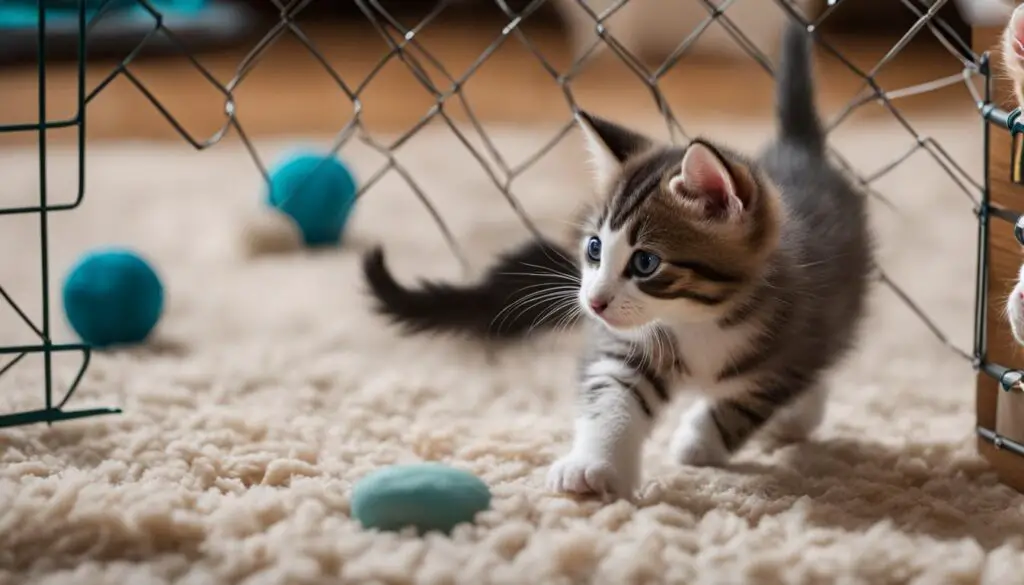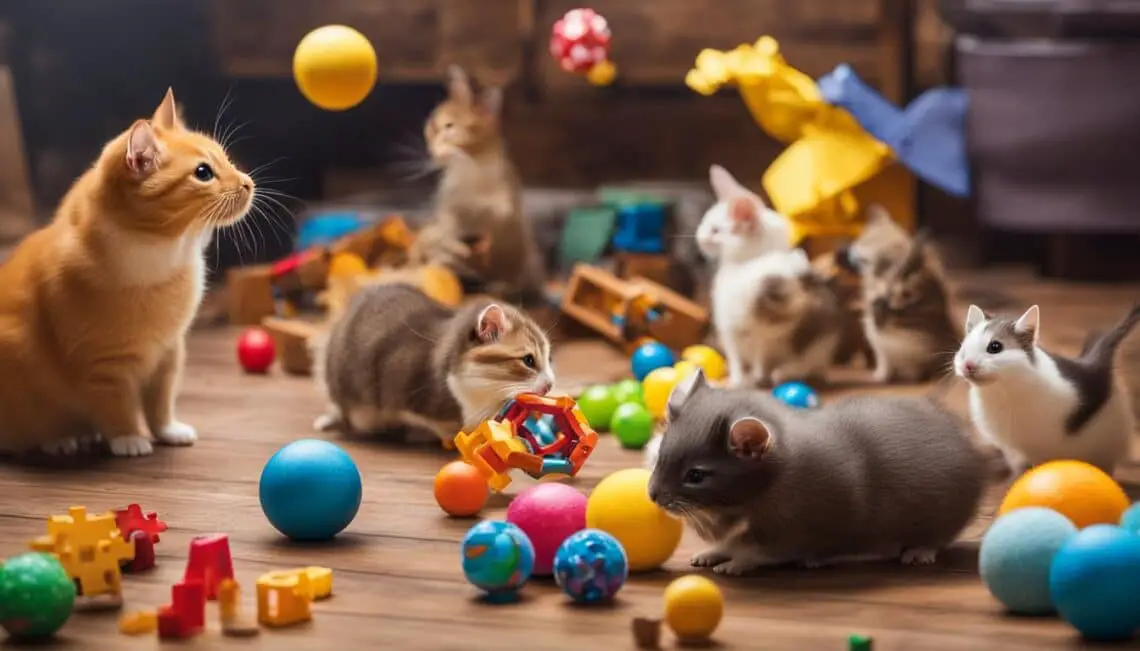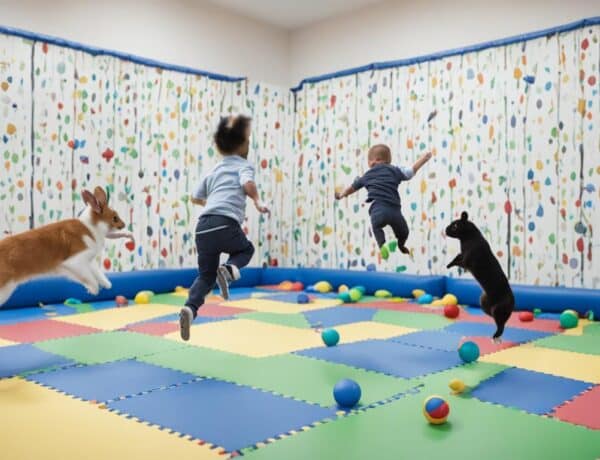Play is an essential aspect of small pet development. Whether you have a kitten or an adult dog, playtime plays a vital role in their physical and mental well-being. Not only does play help them acquire essential skills, but it also strengthens the bond between pets and their owners.
When it comes to kittens, play is not just fun—it’s a way for them to learn and develop important social and predatory skills. Through play, kittens learn how to interact with other cats and develop their hunting abilities. It also helps them build self-confidence and inhibit rough play behaviors.
For adult dogs, playtime provides them with much-needed mental stimulation and physical exercise. It promotes better behavior and relaxation, helps them release excess energy, and keeps their brains active. Playing with their owners also enhances the human-dog bond and increases trust and understanding.
Key Takeaways:
- Play is crucial for small pet development.
- Kittens learn important skills through play, such as socializing and hunting.
- Playtime provides mental stimulation and exercise for adult dogs.
- Playing with your pet strengthens the bond between you.
- Ensure a safe play environment for your pets.
The Role of Play in Kittens’ Development
For kittens, play is not only fun but also serves as a means of learning and development. Social play with their mother and littermates teaches them to understand and communicate with other cats. Play also helps kittens develop their hunting skills through stalking, chasing, and pouncing motions. Furthermore, play fighting and other play behaviors are essential for survival in the wild and for a well-adjusted cat in a household. Playtime with other cats helps kittens learn to inhibit their bites and scratches to prevent damage during play.
During play, kittens engage in a variety of behaviors that contribute to their overall development. They learn important social skills, such as reading and responding to body language, vocalizations, and scent marking. These skills are crucial for building relationships with other cats and establishing their place in a social hierarchy.
Playing with their littermates also helps kittens develop their coordination, balance, and agility. Through play, they learn to perfect their movements, particularly jumping, climbing, and running. These physical skills are essential for navigating their environment and hunting prey.
Playtime provides kittens with mental stimulation as well. Their play behaviors simulate hunting scenarios, allowing them to practice their stalking, chasing, and pouncing skills. This helps sharpen their senses, improve their focus and concentration, and develop problem-solving abilities.
Play fighting is another important aspect of kitten play. It allows them to practice defensive and offensive moves, teaching them self-defense and negotiation techniques. Through play fighting, kittens learn to inhibit their bites and scratches, preventing harm to themselves and their playmates.
Comparison of Play Behaviors in Kittens
| Play Behavior | Description |
|---|---|
| Chasing | Kittens chase after moving objects or other cats, improving their speed and agility. |
| Pouncing | Kittens practice pouncing on stationary or moving targets, honing their hunting skills. |
| Wrestling | Kittens engage in mock fights with their littermates, learning body language and communication cues. |
| Stalking | Kittens silently observe their surroundings and stealthily approach their prey, refining their stealth techniques. |
Understanding the importance of play in kittens’ development allows pet owners to create an enriching environment that promotes their physical, mental, and social growth. Providing appropriate toys, interactive games, and social interactions ensure that kittens receive the stimulation necessary for their overall well-being.
Ensuring Safe Playtime for Kittens
While play is important for kittens’ development, it is crucial to ensure their safety during playtime. Providing suitable toys and creating a safe environment can help prevent accidents and promote a positive play experience for kittens.
Choosing the Right Toys
When selecting toys for kittens, it is important to consider their age, size, and play preferences. Choose toys that are specifically designed for kittens, such as soft and lightweight plush toys or interactive toys that stimulate their natural hunting instincts. Avoid toys with small parts or strings that can pose choking hazards.
Creating a Safe Play Environment
Designate a play area for your kittens that is free from potential dangers. Remove any toxic plants, chemicals, or small objects that they could swallow. Secure electrical cords and keep breakable objects out of reach. Additionally, ensure that the play area is well-ventilated and free from any sharp edges or corners that can cause injuries.
Supervising Playtime
Supervision is essential during your kittens’ playtime to prevent them from getting into potentially dangerous situations. Keep an eye on them to ensure they don’t get stuck in small spaces or accidentally ingest anything harmful. If you notice any signs of distress or exhaustion, it’s important to intervene and provide a safe and quiet space for them to rest.
Training for Gentle Play
As kittens grow older, it’s important to train them to play gently to prevent rough play behaviors. Whenever they engage in rough play or use their claws or teeth aggressively, redirect their attention to appropriate toys and reward them for gentle play. This will help them develop good play manners and prevent any unintentional harm during playtime.
| Play Safety Tips for Kittens |
|---|
| Choose age-appropriate toys |
| Remove small objects and potential hazards |
| Create a safe play environment, free from toxic plants and chemicals |
| Supervise playtime to prevent accidents and injuries |
| Train kittens to play gently and redirect rough play |
Remember, kittens rely on their playtime to learn and develop essential skills. By ensuring their playtime is safe and enjoyable, you are contributing to their overall well-being and happiness.

The Benefits of Play for Adult Dogs
Playtime is not only essential for puppies but also has numerous benefits for adult dogs. Engaging in play with their owners strengthens the bond between humans and dogs, fostering trust and understanding.
One of the significant advantages of play is that it allows dogs to release excess energy, leading to improved behavior and relaxation. By providing an outlet for their natural instincts and physical needs, playtime helps prevent destructive behaviors caused by pent-up energy.
In addition to physical benefits, play provides mental stimulation for adult dogs. Interactive games and toys challenge their minds and keep their brains active, promoting overall mental wellness. Mental stimulation can also be particularly beneficial for senior dogs, helping to combat cognitive decline and keeping their minds sharp.
Furthermore, playtime can help build a dog’s confidence and improve their decision-making abilities. Through play, dogs learn to assess and respond to different situations, honing their problem-solving skills.
“Playtime creates a strong bond between humans and dogs. It’s an opportunity to connect, communicate, and understand one another.”
Regular play sessions also pave the way for positive reinforcement training, making it easier to teach dogs new behaviors or commands. The excitement and engagement during playtime can be harnessed to motivate and reward desired actions, leading to more effective training experiences.
Overall, incorporating play into the daily routine of adult dogs has multiple benefits. It promotes their physical and mental well-being, strengthens the bond with their owners, and enhances their overall quality of life.

The Benefits of Play for Adult Dogs:
- Strengthens the bond between humans and dogs
- Enhances trust and understanding
- Allows dogs to release excess energy, leading to better behavior and relaxation
- Provides mental stimulation and promotes overall mental wellness
- Builds confidence and improves decision-making abilities
- Aids in positive reinforcement training
The Importance of Early Play for Puppies
Play is an essential aspect of a puppy’s early development. During play, puppies learn vital skills and behaviors that shape their socialization and prepare them for adulthood.
One of the primary benefits of play for puppies is the opportunity to establish boundaries and learn about bite inhibition. Through play with their mother and littermates, puppies understand how to play gently without causing harm. They learn to control the strength of their bites, which is important for their interactions with other dogs and humans in the future.
Playing with mother and littermates also helps puppies socialize and understand how to operate within a pack. They learn how to communicate effectively, read body language, and develop healthy relationships with other dogs. This early exposure to social play contributes to their overall safety and well-being as they grow older.
“Playtime is crucial in teaching puppies how to operate within a pack, improving their safety, hunting skills, and ability to raise new generations,” says Dr. Sarah Thompson, a renowned veterinarian.
Furthermore, playtime promotes the development of important motor skills in puppies. Games like fetch encourage them to chase, run, and retrieve objects, helping them enhance their coordination and physical abilities. Engaging in play from an early age supports the growth of strong muscles and bones, ensuring healthy physical development.
Not only does play contribute to puppies’ physical development, but it also stimulates their senses and fosters intellectual growth. Puppy play involves exploring different environments, objects, and stimuli, allowing them to understand the world around them through sight, sound, smell, and touch. This sensory stimulation aids in their cognitive development and helps them make sense of their surroundings.
“Early play allows puppies to explore their environment, use their senses, and learn about the world,” explains Dr. Emily Wilson, a leading animal behaviorist.
The Benefits of Early Play for Puppies:
| Benefits | Description |
|---|---|
| Socialization | Teaches puppies how to interact with others and develop healthy relationships. |
| Bite Inhibition | Helps puppies learn to control the strength of their bites, preventing harm during play. |
| Motor Skill Development | Encourages the growth of coordination, strength, and agility through physical activities. |
| Sensory Stimulation | Allows puppies to explore and understand their environment through their senses. |
By prioritizing playtime for puppies, pet owners significantly contribute to their early development. Engaging in play activities, providing appropriate toys, and encouraging interaction with other puppies all support a puppy’s learning, socialization, and overall well-being.
The Role of Play in Adult Dogs’ Mental Wellness
Play continues to play an important role in the mental wellness of adult dogs. Engaging in play releases endorphins that create joy and happiness, contributing to emotional health and hormonal balance. Mental stimulation during playtime can have a positive impact on dogs with dementia or cognitive decline. Additionally, regular play helps dogs build confidence and exercise their decision-making abilities, leading to a greater sense of well-being.
Play is not just a source of physical exercise for adult dogs, but it also contributes to their mental well-being. When dogs play, their brains release endorphins, which are feel-good chemicals that promote a sense of joy and happiness. These endorphins help alleviate stress and anxiety, promoting emotional health and hormonal balance in adult dogs.
In addition to the emotional benefits, play also provides mental stimulation for adult dogs. Cognitive decline and dementia are common issues that occur as dogs age. However, engaging in regular play helps stimulate their mental faculties, keeping their brains active and agile. This mental stimulation can slow down the progression of cognitive decline and support the overall mental wellness of adult dogs.
Moreover, playtime offers an opportunity for adult dogs to exercise their decision-making abilities. Through interactive games and problem-solving activities, dogs are challenged to make choices and find solutions. This not only engages their minds but also helps build their confidence and strengthen their problem-solving skills. The mental workout provided by play enhances their cognitive function and contributes to a greater sense of well-being.
Playing with adult dogs should be a regular part of their routine. It not only fulfills their physical exercise needs but also contributes to their mental wellness. Whether it’s a game of fetch, hide-and-seek, or puzzle toys, interactive play sessions offer mental stimulation, reduce stress, and promote a happy and balanced life for adult dogs.
Remember, every dog is unique, and their play preferences may differ. Observe your dog’s behavior and tailor play activities to their interests and abilities. By prioritizing play in their daily routine, you are investing in their mental wellness and overall happiness.
Encouraging Play in Dogs of All Ages
Dogs of all ages can benefit from playtime. It is important for dog owners to actively engage in play with their dogs to strengthen the bond and provide mental and physical stimulation. Various DIY techniques, such as Muffin Tray Madness or Treat Hide-n-Seek, can make playtime more enjoyable and engaging for dogs. Playing with your dog not only benefits their well-being but also releases endorphins in your own brain, contributing to your own happiness and overall heart health.
Playing with dogs is not only fun but also has numerous benefits for both you and your furry friend. It helps keep them physically fit, mentally stimulated, and emotionally connected to you. Whether it’s a game of fetch, tug-of-war, or simply running around the backyard, active play can help maintain their overall well-being and prevent behavior problems caused by boredom or excess energy.
“Playtime is not just a luxury; it is a crucial part of a dog’s life. It allows them to channel their instincts, release stress, and build a stronger bond with their owners.”
When engaging in play, it’s important to choose toys that are appropriate for your dog’s age, size, and breed. Interactive toys that dispense treats or puzzle toys that challenge their problem-solving skills can provide mental stimulation. Additionally, rotating the toys and introducing new ones can keep playtime exciting and prevent boredom.
DIY Playtime Ideas
If you’re looking for creative ways to make playtime more enjoyable and engaging for your dog, here are a few DIY playtime ideas:
- Create an obstacle course using household items such as chairs, boxes, and blankets.
- Design a scavenger hunt by hiding treats or toys around the house or backyard.
- Teach your dog new tricks or commands using positive reinforcement and rewards.
Benefits of Play for Dogs
Regular play with your dog offers a multitude of benefits:
| Physical Benefits | Mental Benefits | Emotional Benefits |
|---|---|---|
| Exercise and weight management | Stimulation and problem-solving skills | Bonding and socialization |
| Improved cardiovascular health | Prevention of cognitive decline | Reduced anxiety and stress |
| Increased muscle tone and strength | Enhanced learning and memory | Boosted self-confidence |
As you can see, playtime is not only enjoyable but also essential for the overall well-being of dogs. So go ahead, grab a toy, and let the fun begin!
Conclusion
Play is a fundamental aspect of small pet development, providing numerous benefits for kittens and adult dogs alike. Through play, kittens learn vital skills, such as socialization, communication, and hunting techniques, all essential for their growth and well-being. For adult dogs, playtime strengthens the human-dog bond, promotes mental and physical health, and encourages confident decision-making. By recognizing the importance of play, pet owners can contribute to the overall health and happiness of their furry friends.
Whether it’s chasing a ball, exploring interactive toys, or engaging in fun games with their owners, play should be an integral part of every small pet’s life. It not only provides physical exercise and mental stimulation but also fosters a strong emotional connection between pets and their owners. Playtime creates joy and happiness for both the pets and their human companions.
As responsible pet owners, we should prioritize play and ensure our small pets have a safe and stimulating environment for their playtime. Providing suitable toys, supervising their play, and encouraging gentle and appropriate behaviors are indispensable for their well-being. By incorporating play into our pets’ daily routines, we can help them develop important skills, promote their physical and mental health, and strengthen the bond we share with our beloved companions. So, let’s remember the importance of play and let our furry friends enjoy the wonders of playtime every day!
FAQ
Why is play important in small pet development?
Play is crucial for small pet development as it helps them acquire essential skills and promotes their overall well-being.
What play behaviors are important for kittens?
Kittens engage in various play behaviors such as running, climbing, pouncing, and pawing, which are vital for their social, predatory, and locomotion skills.
How does play help shy kittens?
Play helps shy kittens build self-confidence and inhibits rough play.
How does playtime benefit puppies?
Playtime is essential for the development of puppies as it teaches them about boundaries, socializing, and bite inhibition.
What toys are suitable for kittens during playtime?
Suitable toys for kittens during playtime include cat trees, perching posts, and interactive toys.
How can I ensure the safety of kittens during playtime?
To ensure the safety of kittens during playtime, it is important to provide a safe play environment, avoid leaving string toys or small objects that can be easily swallowed, and provide supervision to prevent them from getting stuck or getting into dangerous situations.
What are the benefits of play for adult dogs?
Playtime with their owners strengthens the bond between dogs and their owners, releases excess energy, provides mental stimulation, improves decision-making abilities, and promotes overall mental wellness for adult dogs.
Why is early play important for puppies?
Early play with their mother and littermates teaches puppies about boundaries, socializing, and bite inhibition, and helps them develop important motor skills.
How does play contribute to the mental wellness of adult dogs?
Engaging in play releases endorphins that contribute to emotional health and hormonal balance, provides mental stimulation, and can have a positive impact on dogs with dementia or cognitive decline.
How can I encourage play in dogs of all ages?
Active engagement in play with dogs, using DIY techniques such as Muffin Tray Madness or Treat Hide-n-Seek, can strengthen the bond and provide mental and physical stimulation for dogs of all ages.
What is the importance of play in small pet development?
Play is an essential component of small pet development as it helps them learn vital skills and behaviors, promotes physical and mental well-being, and strengthens the bond between pets and their owners.





1 Comment
Fitspresso
March 5, 2024 at 4:19 pmI just could not leave your web site before suggesting that I really enjoyed the standard information a person supply to your visitors Is gonna be again steadily in order to check up on new posts